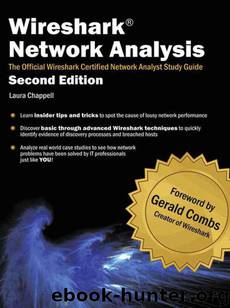Wireshark Network Analysis (Second Edition): The Official Wireshark Certified Network Analyst Study Guide by Chappell Laura

Author:Chappell, Laura [Chappell, Laura]
Language: eng
Format: epub, mobi
ISBN: 9781893939943
Publisher: Chappell University
Published: 2012-06-28T22:00:00+00:00
Checksum
The checksum field covers the ICMP header only.
Basic ICMPv6 Functionality
RFC 4443 defines the purpose and functionality of ICMPv6. The ICMPv6 packet structure is the same as the ICMP packet structure.
Figure 217 shows an ICMPv6 Echo Request. The packets in this trace are 6to4 packets.
Figure 217. ICMPv6 uses Type 128 and 129 for Echo Requests and Echo Replies [ipv6-pinginipv4.pcapng]
The following list defines the types of ICMPv6 messages that can be sent on the network. This list is based on IANA documentation last updated on March 28, 2012. To obtain the most current version of this list, visit www.iana.org/assignments/icmpv6-parameters.
Type 0 Reserved
Type 1 Destination Unreachable [RFC4443]
Type 2 Packet Too Big [RFC4443]
Type 3 Time Exceeded [RFC4443]
Type 4 Parameter Problem [RFC4443]
Type 100 Private Experimentation [RFC4443]
Type 101 Private Experimentation [RFC4443]
Type 102-126 Reserved
Type 127 Reserved for Expansion of ICMPv6 error messages [RFC4443]
Type 128 Echo Request [RFC4443]
Type 129 Echo Reply [RFC4443]
Type 130 Multicast Listener Query [RFC2710]—sent by an IPv6 router to locate general or specific multicast listeners on the local network
Type 131 Multicast Listener Report [RFC2710]—sent by IPv6 hosts to indicate they are listening for a particular multicast address on an interface
Type 132 Multicast Listener Done [RFC2710]—can be sent by an IPv6 node to indicate that it has stopped listening to a multicast address on an interface
Type 133 Router Solicitation [RFC4861]—can be sent when an interface becomes enabled, to request routers to generate Router Advertisements immediately rather than at their next scheduled time
Type 134 Router Advertisement [RFC4861] —used by IPv6 routers to advertise their presence together with various link and Internet parameters either periodically, or in response to a Router Solicitation message
Type 135 Neighbor Solicitation [RFC4861]—sent by a node to determine the link-layer address of a neighbor or to verify that a neighbor is still reachable via a cached link-layer address. Neighbor Solicitations are also used for Duplicate Address Detection as seen in Figure 207.
Type 136 Neighbor Advertisement [RFC4861]—a response to a Neighbor Solicitation message. A node may also send unsolicited Neighbor Advertisements to announce a link-layer address change.
Type 137 Redirect Message [RFC4861]
Type 138 Router Renumbering [Crawford]
Type 139 ICMP Node Information Query [RFC4620]
Type 140 ICMP Node Information Response [RFC4620]
Type 141 Inverse Neighbor Discovery Solicitation Message [RFC3122]
Type 142 Inverse Neighbor Discovery Advertisement Message [RFC3122]
Type 143 Version 2 Multicast Listener Report [RFC3810]
Type 144 Home Agent Address Discovery Request Message [RFC6275]
Type 145 Home Agent Address Discovery Reply Message [RFC6275]
Type 146 Mobile Prefix Solicitation [RFC6275]
Type 147 Mobile Prefix Advertisement [RFC6275]
Type 148 Certification Path Solicitation Message [RFC3971]
Type 149 Certification Path Advertisement Message [RFC3971]
Type 150 ICMP messages utilized by experimental mobility protocols such as Seamoby [RFC4065]
Type 151 Multicast Router Advertisement [RFC4286]
Type 152 Multicast Router Solicitation [RFC4286]
Type 153 Multicast Router Termination [RFC4286]
Type 154 FMIPv6 Messages [RFC5568]
Type 155 RPL Control Message [RFC-ietf-roll-rpl-19.txt]
Types 156-199 Unassigned
Type 200 Private experimentation [RFC4443]
Type 201 Private experimentation [RFC4443]
Type 255 Reserved for expansion of ICMPv6 informational messages [RFC4443]
The following list provides the descriptions of the more common ICMPv6 Types that support code fields or have an interesting use.
Type 1 Destination Unreachable Codes
Code 0: No route to destination—you got all the way to a
Download
Wireshark Network Analysis (Second Edition): The Official Wireshark Certified Network Analyst Study Guide by Chappell Laura.mobi
This site does not store any files on its server. We only index and link to content provided by other sites. Please contact the content providers to delete copyright contents if any and email us, we'll remove relevant links or contents immediately.
Kotlin in Action by Dmitry Jemerov(19237)
Grails in Action by Glen Smith Peter Ledbrook(16730)
Sass and Compass in Action by Wynn Netherland Nathan Weizenbaum Chris Eppstein Brandon Mathis(14220)
Configuring Windows Server Hybrid Advanced Services Exam Ref AZ-801 by Chris Gill(7515)
Azure Containers Explained by Wesley Haakman & Richard Hooper(7512)
Running Windows Containers on AWS by Marcio Morales(7064)
Microsoft 365 Identity and Services Exam Guide MS-100 by Aaron Guilmette(5449)
Microsoft Cybersecurity Architect Exam Ref SC-100 by Dwayne Natwick(5287)
Combating Crime on the Dark Web by Nearchos Nearchou(5037)
The Ruby Workshop by Akshat Paul Peter Philips Dániel Szabó and Cheyne Wallace(4720)
Management Strategies for the Cloud Revolution: How Cloud Computing Is Transforming Business and Why You Can't Afford to Be Left Behind by Charles Babcock(4562)
Python for Security and Networking - Third Edition by José Manuel Ortega(4293)
The Age of Surveillance Capitalism by Shoshana Zuboff(4272)
Learn Wireshark by Lisa Bock(4192)
Learn Windows PowerShell in a Month of Lunches by Don Jones(4175)
Ember.js in Action by Joachim Haagen Skeie(4054)
The Ultimate Docker Container Book by Schenker Gabriel N.;(3937)
DevSecOps in Practice with VMware Tanzu by Parth Pandit & Robert Hardt(3624)
Windows Ransomware Detection and Protection by Marius Sandbu(3596)
